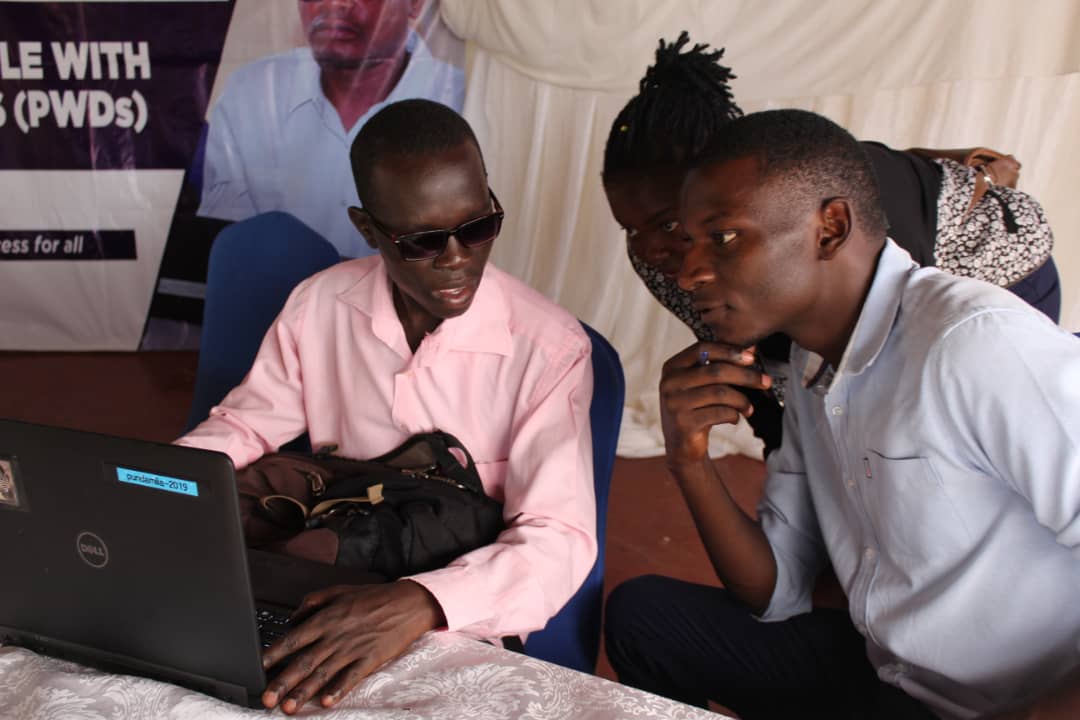
MBALE– Only 27 years old and blind, Denis Komakech’s computer knowledge is admirable. Not surprisingly, Komakech has gained fame as an activist for ICTs, targeting persons with special needs.
An employee of Oysters & Pearls, an educational programme that supports blind students in science, technology, engineering and maths, Komakech has been training persons with special needs, empowering them to take advantage of ICTs.
He is one of the key training staff at the Uganda Communications Commission/Rural Communication Development Fund sensitisation workshop in support of ICTs for PWDs that took place in Mbale last week.
At Green Gardens in Mbale, Komakech is wearing dark-rimmed spectacles, a pair of blue trousers and a pink shirt. His brown jungle boots, I am told, offer him protection from hard objects as he walks.
As Komakech opens up about stigma and what it means to be visually-impaired, it is evident he is best placed to not only train but also inspire others. He is a symbol of hope for those like him who believe that their disability is not inability. “Now there’s hope; we want to use this opportunity given to us by UCC, to change the mindset and create awareness,” he says.
UCC and Oysters & Pearls have partnered to deliver ICT training to PWDs and Komakech was in Mbale to conduct the second of such workshops, having done the same in the first one held in Gulu the previous week.
“We need to reach every child who is blind because I have discovered if you’re in a community and you have papers, you have the skills, you can contribute to the development of your country,” Komakech says.
“We can do almost everything once [armed] with the skills in terms of ICT learning,” he emphasises, adding that “the assistive technologies give us some sort of independence.”
With his computer skills, Komakech says he doesn’t need much help to survive. “I can now survive in any environment like [other] persons,” he asserts.

The computer skills helped him to complete his Bachelor’s degree in Social Work and Social Administration (SWSA) without much ado.
“When I joined Makerere [University] in 2014, I was already a star [in using computer applications]. I would help fellow students in computer, even those who weren’t blind,” he says. Komakech wasn’t born blind. He was told that a measles infection at the age of 3 led to his gradual blindness.
“I [struggled] for many years until 2005 when I was taken to a referral hospital in Gulu where they assessed me and said it was going to be hard to regain my sight,” he said.
However, that didn’t stop Komakech. Two weeks after getting the terrible news, he joined Primary Six in a specialised primary school where he started learning Braille (a writing system for visually impaired people, consisting of patterns of raised dots that are read by touch).
A year later, he sat for Primary Leaving Examinations and subsequently joined Gulu High School where he continued to study Braille for another four years.
In the corridors of Green Gardens, Komakech meets Esther, a waitress he quickly recognises from her voice and calls out her name. The two had only met at the hotel’s reception area the previous evening as he checked in.
Asked how he could possibly recognise Esther so quickly, Komakech replies: “They trained us; if you’re blind, then you have got to use all other senses.” On how he managed to sit and pass examinations and coursework at the university given his condition, Komakech emphasises the importance of assistive technologies for persons with special needs.
“Coursework could be a source of pressure if you didn’t have an Internet connection or lacked the knowledge and skills to use a computer,” he says. “But for me, I didn’t have much of that pressure because I had a tool and I was a star at using it.” He also had a network of friends to rely on when it was absolutely necessary.
Earlier in the day, Komakech was the centre of attraction as he addressed stakeholders who included District Education Officers, Ministry of Education officials, inspectors of schools, headteachers and representatives of institutions supporting Persons with Special Needs (PSNs), stressing the importance of awareness and fighting stigma.




